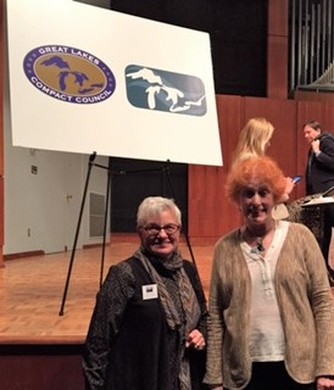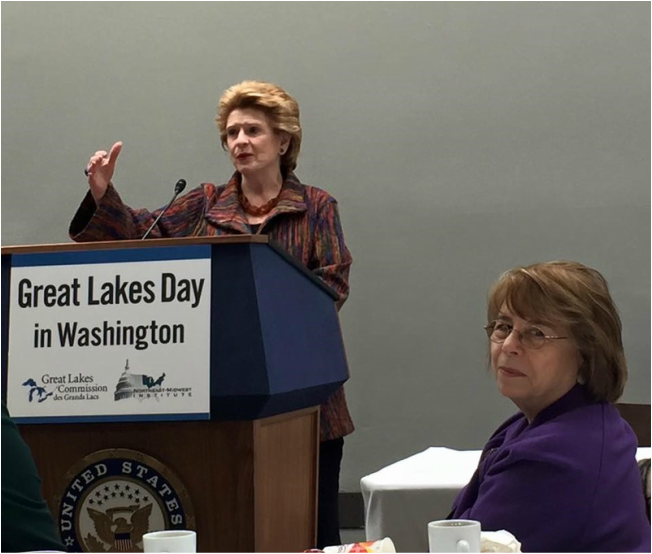|
Congratulations to the Healing Our Waters Coalition for organizing a terrific Great Lakes Days event in Washington DC. Leaguers played an important part of this group of over 100 Lake lovers who convened in February to get updates on the successes of the Great Lakes Restoration Initiative, hear speakers, and participate in in-person meetings with elected representatives and staff on Capitol Hill. One of our most effective handouts for making our case is a description of restoration successes from around the Great Lakes region, which can be accessed here .
The Great Lakes Restoration Initiative (GLRI) is an inter-agency program designed to address the most significant problems in the Great Lakes and works to protect, restore and maintain the Great Lakes Ecosystem. It has traditionally enjoyed bi-partisan support. At our Congressional breakfast both Republicans and Democrats from both Houses addressed the group in support of our work. Unfortunately, President Obama’s current budget requests only $250 million for FY 2017. We were lobbying to have that amount restored to $300 million to maintain the current level of funding because, although GLRI is showing real and measurable results, there is still plenty of work to be done. LWVLMR supports authorization and multi-year funding of $300 million per year for the GLRI and encourages you to contact your federal legislators in support of this position. The visit was timely as there is heightened concern about drinking water across the states, due to the crisis in Flint, MI. So in addition to the request for GLRI support, we were also asking for a boost to the Clean Water and Drinking Water State Revolving Fund programs that help local communities upgrade aging water infrastructure to protect drinking water, reduce sewer overflows, and prevent beach contamination. Additionally, protection against Asian carp and other invasive species coming through the Chicago Area Waterways was sought, with emphasis on speeding up the Brandon Road Feasibility study by the Army Corps of Engineers. Brandon Road is the site of a Lock and Dam on the Illinois River and was identified as a possible choke point to stop the fish in a previous study which we lobbied for. All of our Great Lakes LWV states except Pennsylvania are members of the Healing Our Waters Coalition. Their annual conference will be September 20-22, 2016 in Sandusky, OH this year and we encourage League members to attend. "If Waukesha's application were approved in its present state, it would set a terrible precedent for the entire Great Lakes region and weaken the Compact!"  Marjorie Palleon and Claire Vanderslice at the Hearing. Marjorie Palleon and Claire Vanderslice at the Hearing. On Thursday, February 18, 2016, the Carroll University Shattuck Music Center, Room 122, was filled with hundreds of people interested and concerned about the first Great Lakes water diversion application. Busloads of people arrived from all over Wisconsin, Illinois, Michigan, Indiana, and even New York. Most were eager to state why they did not want this diversion to happen. We arrived early to sign up to speak and observe the area. The stage was filled with 12 chairs for the Governors and Premiers or their representatives. A microphone stood ready in the center floor walkway for public hearing presenters. At 2 pm, officials from DNR and Waukesha were on stage with slide presentations. They also answered questions from the audience regarding the diversion, radium pollution and removal, wetlands, sewers, wells, conservation, alternate water sources, and more. Promptly at 3 pm, the chairperson of the Great Lakes and St. Lawrence Governors and Premiers explained the public hearing rules to the audience. No one could speak unless they had signed in, and then been called by the chairperson. The organizers decided the order. First, all 20-30 officials from mayor, alderman, city planners, water and sewer planners and individuals of Waukesha appeared, the mayors of surrounding communities, and finally well know individuals from environmental organizations such as Elizabeth Wheeler, Todd Ambs, George Meyer of WI Wildlife Federation, Karen Hobbs of NRDC, ACLU and many more. It was then 6 pm and supper break was announced. There were 75 presenters left and the Governors and Premiers stated they would stay "until they were done." Many individuals left as the buses were leaving. We also left. Our statement had been received prior to the meeting by email, and we did not know if and when we would be called. Interesting information from the presentations:
Reported by Marjorie Palleon, LWV of Ozaukee Area and LWVLMR Delegate The 2008 Great Lakes Compact protects the water resources of the Great Lakes Basin from diversions and excessive withdrawals. Diversions away from the Great Lakes may be considered under the Compact, but only under strict conditions.
Waukesha, WI, is the first community to apply for a diversion. Some of its water comes from groundwater contaminated by radium and, in 2012, Waukesha began the process of requesting permission to remove water from Lake Michigan and send it to residents and businesses located out of the watershed. A revised diversion application has been approved by the Wisconsin Department of Natural Resources and now goes to the Regional Body and the Governor's Compact Council for review. Interested individuals and organizations may submit comments through March 14, 2016. A public hearing will be held on February 18, 2016, at Carroll University in Waukesha. To read the application and learn about the review process, visit the Wisconsin DNR Waukesha Diversion webpage. |
Archives
December 2017
Categories
All
|


 RSS Feed
RSS Feed